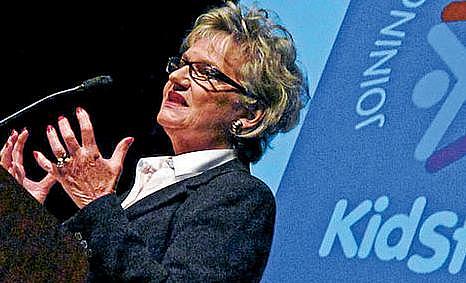Marple urges collaboration on obesity, teen pregnancy and hunger
SThis story is part of Kate Long's fellowship project where she explores West Virginia's epidemics of chronic disease and obesity and the efforts to reserve them. The series is called "The Shape We're In."

CHARLESTON, W.Va. -- State School Superintendent Jorea Marple slipped out of her high heels in the corner of the Charleston Civic Center stage and jumped a bit of rope with kids from Putnam County's Lakeview Elementary, minutes before she began her keynote address at the Department of Education's KidStrong wellness conference.
The children were there to demonstrate fancy jump-rope tricks. Marple was grabbing a little fun before she spoke.
A few minutes later, shoes back on, she shifted gears and challenged 800 attendees to find collaborative ways to tackle three heart-wrenching problems she said are "too big for schools to handle alone."
Teen pregnancy, obesity and child hunger keep many young West Virginians from learning effectively, "and we would be naïve to think that the schools can fix them in isolation," Marple said. "That's why we're committed to collaboration."
In each community, "teachers, health care workers, politicians, grandparents, aunts and uncles" must join forces to address each problem, she said. "It's a moral imperative."
Marple praised Sen. Rockefeller's recent Charleston forum on hunger. "Hungry children often can't sit still. They may put their head down on the desk. They may misbehave and often say they're sick." All that gets in the way of learning, she said.
More than 40,000 West Virginia children live in extreme poverty, she said. "That means they don't eat sometimes.
"This year, we carried out a pilot project to feed all our children without cost in eight counties," she said. The preliminary results in Mingo County are startling, she said. "Their suspensions and discipline problems are down dramatically. Not a single kid was expelled this year, and attendance is up. The teachers say the kids are focusing much better."
The state Department of Education and the Department of Health and Human Resources are collaborating on these issues, she said. They have pooled funds to hire wellness specialists for each region.
As part of their jobs, the specialists are charged to go into communities and bring people together to address these issues, she said: "the parents, teachers, health care workers, grandparents, politicians."
They started with teen pregnancy this year. West Virginia is the only state in which the teen birth rate increased between 2007 and 2009 "West Virginia increased 17 percent," she said. "Wrong direction!
"We know that 33 percent of teen mothers do not finish high school, and girl babies born to teen mothers often become teen mothers themselves." They live in poverty and have serious health and emotional issues more often, she said. One in five babies is born with exposure to drugs or alcohol.
Next, the wellness specialists may tackle obesity. If so, they will help communities create opportunities for physical activity and help schools incorporate more physical activity into the children's day.
Marple reminded the audience that at least one in four West Virginia fifth-graders are obese, as measured by West Virginia University. One in four have high blood pressure and abnormal cholesterol.
One in three young West Virginians is now predicted to develop diabetes. "That is preventable," she said. "We've got to get these young people moving!" she said. "It's starting to happen. I've seen kids doing Zumba first thing in the morning. I've seen teachers who get kids up and moving after 20 minutes of sitting, to keep them focused."
Marple praised dozens of West Virginia schools that cooked from scratch this year. "We've got to get rid of the processed foods," she said. "The West Virginia Board of Education has adopted the strongest nutritional guidelines in the nation, but we've got lots more to do."
"We can't fix public education issues without thinking about the whole child," Marple said. "For way too long, we have thought that, if we simply do reading and math all day long and we drill and practice, it will turn out well for everybody," she said. "I don't think it works that way. We cannot tear the kid into individual pieces and only concentrate on what they might not be good at doing."
"Everybody is needed to solve these problems," she said. Adults need to encourage kids, model healthy behaviors and find ways to help kids be active. "If we work together, we can do it," she said.
The KidStrong Conference continues at the Civic Center today with sessions on school health services, physical education and wellness.
This article was originally published on The Charleston Gazette

